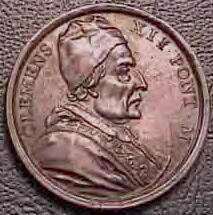 Another conclave in which the representatives of the Great Powers battled through weary months ended on July 12, 1730, with the election of feeble old Lorenzo Corsini, who took the name Clement XII.
Another conclave in which the representatives of the Great Powers battled through weary months ended on July 12, 1730, with the election of feeble old Lorenzo Corsini, who took the name Clement XII.
Lorenzo Corsini was born at Florence on April 7, 1652, of an ancient family, the most famous member of which was St. Andrew Corsini. Lorenzo passed up the paternal estates to enter the clerical ranks. After studies at the Jesuit Roman College, he took a doctorate in law at the University of Pisa. He proved to be a hard-working, capable papal official and was made treasurer by Innocent XII and a cardinal by Clement XI. His experience in papal government made him shrewder than his predecessor, but his age and health greatly handicapped him. Seventy-nine at his election, Clement soon went completely blind and for a large part of his pontificate had to rule from his bed. But there was still plenty of mental vigor in the old man, and he had the happy faculty of choosing honest and competent officials.
Clement began by making a clean sweep of the corrupt Beneventan officials and an example of the chief offender, Cardinal Coscia. He imposed a large fine and a prison sentence on that grafter, an act of salutary severity. Under Clement XII the government of the Papal States improved, though some may object to his use of the lottery as a painless way of raising money.
In dealing with the Great Powers, Clement suffered the same humiliations as most eighteenth century popes. His suzerain right over Parma was ignored, and Bourbons vied with Hapsburgs in putting pressure on the old Pope. The Pope did not find the eighteenth-century despots particularly benevolent.
Clement continued to insist on Jansenist submission to the bull "Unigerlitus," and he had the satisfaction of receiving the submission of a group of French monks. But while the Jansenist menace subsided, another and greater evil loomed up over the age, the onrush of infidelity. Clement struck at this new enemy by his bull of 1738 which condemned Freemasonry. This he did because all too often the un-Christian and anti-Christian tendencies of the age were channeled into the lodges. Masonic religiosity was well suited to the deism of the age. Clement did much to further mission activity. He had the joy of receiving back to Catholic unity a large number of Monophysite Copts.
As pope, Clement continued the patronage of art and letters he had begun as cardinal. He did much to beautify Rome.
Cardinal Alberoni, the one-time ambitious and all-powerful prime minister of Spain, was now like Napoleon in Elba as a papal official. He attacked little San Marino and annexed it to the Papal States. Clement XII, learning that this was unjust, restored its liberty to the mountain republic.
After almost ten years Clement XII finally succumbed to a number of diseases on February 6, 1740.
Excerpted from "Popes
Through the Ages" by Joseph Brusher, S.J.

